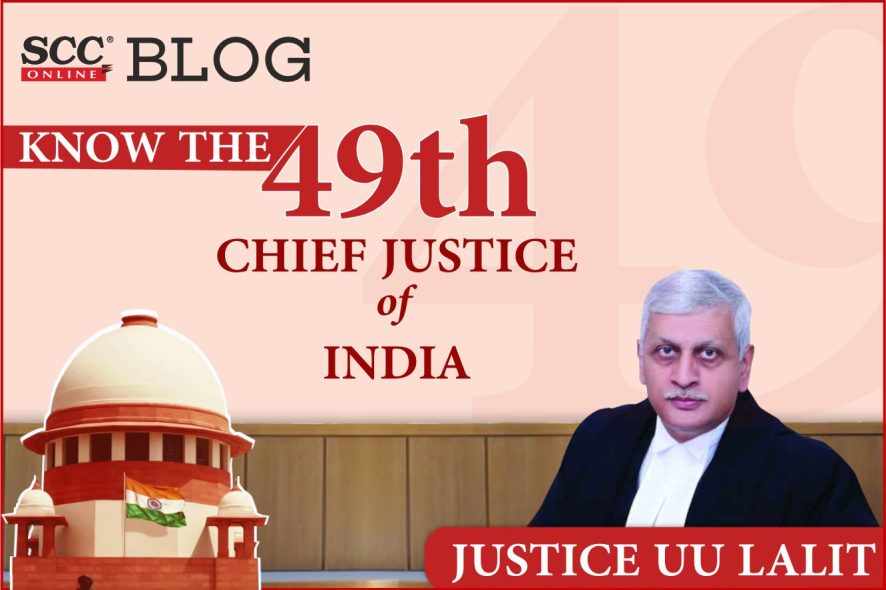As Justice NV Ramana bid adieu to the Chief Justiceship of India, Justice Uday Umesh Lalit has taken over as the 49th Chief Justice of India. On his last working day as the Chief Justice of India, Justice Ramana, while addressing the bar, said that he was leaving the Supreme Court in very able hands.
Justice Lalit’s father, Justice UR. Lalit, was a former additional judge of the Bombay High Court, Nagpur bench. He joined the bar in 1983 and practiced as an advocate in the Bombay High Court from 1983 to 1985. In 1986, he joined the chambers of Former Attorney General for India, Soli Sorabjee from 1986 to 1992. In 2004, he was designated as a senior advocate and also served as a member of the Supreme Court’s Legal Services Committee for two terms.[1] As a senior advocate he specialised in criminal cases and was appointed as CBI’s Special Public Prosecutor in all 2G matters, under the Supreme Court’s orders.
Justice Lalit, was the 6th Senior Advocate to be directly elevated to the Supreme Court as a judge. After becoming a Supreme Court judge in 2014, Justice Lalit has delivered over 270 judgments so far,[2]
In the Farewell Function of Justice NV Ramana organised by the Supreme Court Bar Association, Justice Lalit said,
“It is a tough time for someone like me. Look at the popularity of my predecessor. How am I going to don that mantle now hereafter. I express my complete inability to match and go anywhere near this popularity.”
While he appreciated the contribution of Justice NV Ramana during his tenure as the Chief Justice of India, Justice Lalit especially commended Justice Ramana’s contribution is persuading the State Governments for establishment of the Office of Public Defender/Legal Aid Defence Counsel in each district on the lines of Public Prosecutor’s office. He highlighted that,
“In every State the Government is willing to provide us space for the Offices. We owe this to Justice Ramana’s perseverance.”
Focus Areas as the new Chief Justice of India
Justice Lalit, who is due to retire in November, 2022, has highlighted these three areas that he would like to work on as the new Chief:
Listing of Matters:
“I assure you that we will strive hard to make listing as simple, as clear and as Transparent as possible.”
Mentioning of matters:
“Very shortly we will have a clear-cut regime where any urgent matters can freely be mentioned before the respective Courts.”
Listing of matters before the Constitution Benches and matters referred to 3-judge Benches:
“I have always believed that the role of the Supreme Court is to lay down the law with clarity and consistency and the best possible way to do it is to have larger Benches as early as possible wherever the matters are referred to such benches so that the issues get clarified immediately, the matter has consistency and people are well aware of what exactly are the contours of the peculiar positions of law.”
He added that he will work towards ensuring that the Supreme Court always has at least one Constitution Bench functioning all throughout the year.
Important Judgments as a Supreme Court judge
One of the most important judgments delivered by the benches headed by him, is the POCSO skin to skin verdict, where he, along with Bela Trivedi (who authored the judgment) and S. Ravindra Bhat (who authored the concurring opinion), JJ, set aside the Bombay High Court (Nagpur Bench) judgment that had acquitted the accused under Section 8 of the POCSO Act, 2012 on the ground that no direct physical contact i.e. skin to skin with sexual intent without penetration would not amount to ‘sexual assault’. [Read: POCSO| “Touch”, “physical contact” can’t be restricted to “skin to skin contact”; “sexual intent” is the key. SC reverses Bombay HC’s “dangerous precedent”]
Recently, Justice Lalit headed the 3-judge bench that imposed sentence of four months and fine of Rs.2,000/- on Vijay Mallya for contempt of Court after observing that he “never showed any remorse nor tendered any apology for his conduct” of transferring a huge sum of US$40 million to his children instead of repaying his debt of more than Rs. 9000 crores to the banks. [Read: Four months in prison; Rs. 2000 fine for Vijay Mallya for contempt; US$40 million to be deposited by him and beneficiaries at 8% interest per annum]
He was also the part of the 3-judge bench that overruled 1983’s ruling in Y.V. Rangaiah v. J. Sreenivasa Rao (1983) 3 SCC 284 and held that there is no universal rule to fill vacancies on the basis of the law which existed on the date when they arose. [Read: No universal rule to fill vacancies on the basis of the law which existed on the date when they arose; Supreme Court overrules 1983’s YV Rangaiah ruling ]
The bench of Justice Lalit and Justice KM Joseph, JJ has dismissed the bail plea of activist Gautam Navlakha arrested in relation to the Bhima Koregoan riots case. [Read: Here’s why Gautam Navlakha was not able to make a case for default bail before the Supreme Court] The bench had, in the same verdict also held that it is open for Courts to order house arrest under Section 167 CrPC..
You can read more about the judgments delivered by Justice Lalit in our Know Thy Judge Post here.
[1] Supreme Court Observer, Judges’ archive
[2] SCC Online’s ‘Judge only’ feature.






